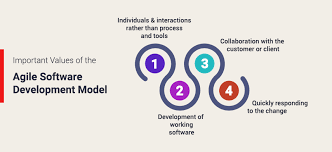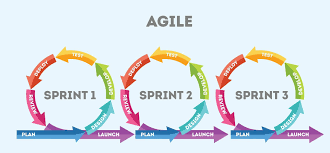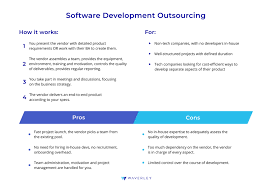Unlocking Success: The Agile Development Team Advantage
The Power of Agile Development Teams
Agile development has revolutionized the way software is created and delivered. At the heart of agile methodology lies the agile development team, a dynamic and collaborative group of individuals working together to achieve a common goal.
Key Characteristics of Agile Development Teams
Agile development teams are characterized by:
- Rapid Adaptability: Agile teams are quick to respond to changes in requirements or priorities, ensuring that the project stays on track.
- Collaboration: Team members work closely together, sharing knowledge and expertise to deliver high-quality results.
- Transparency: Agile teams maintain open communication channels, keeping all stakeholders informed about project progress and challenges.
- Iterative Approach: Projects are broken down into smaller, manageable tasks that are completed in short iterations, allowing for continuous feedback and improvement.
- Customer Focus: Agile teams prioritize delivering value to the customer by incorporating feedback and adapting to changing needs.
The Benefits of Agile Development Teams
By embracing agile principles and practices, development teams can enjoy a range of benefits, including:
- Increased Flexibility: Agile teams can easily pivot in response to changing requirements or market conditions.
- Faster Time-to-Market: The iterative nature of agile development allows for quicker delivery of usable features and products.
- Improved Quality: Continuous testing and feedback loops help identify and address issues early in the development process.
- Enhanced Collaboration: Agile teams foster a culture of collaboration and shared responsibility, leading to higher team morale and productivity.
- Customer Satisfaction: By involving customers throughout the development process, agile teams ensure that the final product meets their needs and expectations.
In Conclusion
Agile development teams play a crucial role in driving innovation, efficiency, and success in today’s fast-paced digital landscape. By embracing agility and collaboration, these teams can deliver exceptional results while adapting to ever-changing market demands. The power of agile development teams lies in their ability to evolve, learn, and continuously improve – ultimately creating value for both businesses and end-users alike.
7 Essential Tips for Building an Effective Agile Development Team
- Encourage open communication and collaboration within the team.
- Prioritize frequent delivery of working software to gather feedback early.
- Adapt to changes in requirements and priorities quickly.
- Empower team members to make decisions and take ownership of their work.
- Regularly reflect on ways to improve processes and teamwork.
- Ensure clear goals and expectations are set for each iteration or sprint.
- Promote a culture of continuous learning and improvement.
Encourage open communication and collaboration within the team.
Encouraging open communication and collaboration within an agile development team is essential for fostering a culture of transparency and teamwork. When team members freely share ideas, feedback, and information, it promotes a deeper understanding of project goals and requirements. Collaboration allows team members to leverage each other’s strengths, leading to more innovative solutions and efficient problem-solving. By maintaining open communication channels, agile teams can address challenges proactively, build trust among team members, and ultimately deliver high-quality results that meet customer expectations.
Prioritize frequent delivery of working software to gather feedback early.
In agile development teams, prioritizing the frequent delivery of working software is a key strategy to gather feedback early in the development process. By delivering functional components or features regularly, team members can engage with stakeholders and end-users to gather valuable feedback on the product’s usability, functionality, and alignment with requirements. This approach allows for early identification of potential issues, enables quick adjustments based on feedback, and ultimately leads to the development of a product that better meets the needs and expectations of its users.
Adapt to changes in requirements and priorities quickly.
In agile development teams, the ability to adapt swiftly to changes in requirements and priorities is a fundamental principle that drives success. By embracing a flexible mindset and being responsive to evolving needs, agile teams can ensure that projects stay on course and deliver value efficiently. This proactive approach not only fosters collaboration within the team but also enables them to meet customer expectations effectively. Embracing change as a constant in the development process empowers agile teams to stay ahead of the curve and continuously refine their strategies for optimal outcomes.
Empower team members to make decisions and take ownership of their work.
Empowering team members to make decisions and take ownership of their work is a key tip for building a successful agile development team. By entrusting individuals with the autonomy to make choices and be accountable for their tasks, team members are more motivated, engaged, and invested in the project’s success. This approach fosters a culture of responsibility, innovation, and continuous improvement within the team, ultimately leading to higher productivity, better collaboration, and quality outcomes.
Regularly reflect on ways to improve processes and teamwork.
Regularly reflecting on ways to improve processes and teamwork is a key tip for agile development teams. By taking the time to evaluate current practices, identify areas for enhancement, and implement necessary changes, teams can continuously evolve and optimize their performance. This reflective approach fosters a culture of learning and growth within the team, leading to increased efficiency, collaboration, and overall success in delivering high-quality results.
Ensure clear goals and expectations are set for each iteration or sprint.
To maximize the effectiveness of an agile development team, it is crucial to establish clear goals and expectations for each iteration or sprint. By defining specific objectives and outcomes at the outset, team members can align their efforts and focus on delivering tangible results within a set timeframe. This practice not only enhances productivity but also promotes transparency, accountability, and collaboration within the team, ultimately leading to successful project outcomes and continuous improvement.
Promote a culture of continuous learning and improvement.
Promoting a culture of continuous learning and improvement within an agile development team is essential for fostering innovation and driving success. By encouraging team members to seek new knowledge, refine their skills, and embrace feedback, the team can stay ahead of industry trends, adapt to changing requirements, and deliver high-quality results consistently. Embracing a mindset of continuous learning not only enhances individual growth but also strengthens the collective capabilities of the team, leading to increased efficiency, collaboration, and overall project success.












